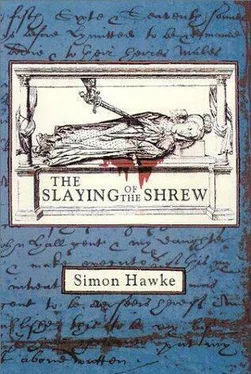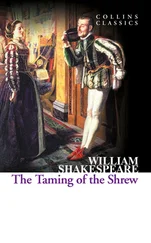Simon Hawke - The Slaying Of The Shrew
Здесь есть возможность читать онлайн «Simon Hawke - The Slaying Of The Shrew» весь текст электронной книги совершенно бесплатно (целиком полную версию без сокращений). В некоторых случаях можно слушать аудио, скачать через торрент в формате fb2 и присутствует краткое содержание. Жанр: Исторический детектив, на английском языке. Описание произведения, (предисловие) а так же отзывы посетителей доступны на портале библиотеки ЛибКат.
- Название:The Slaying Of The Shrew
- Автор:
- Жанр:
- Год:неизвестен
- ISBN:нет данных
- Рейтинг книги:5 / 5. Голосов: 1
-
Избранное:Добавить в избранное
- Отзывы:
-
Ваша оценка:
- 100
- 1
- 2
- 3
- 4
- 5
The Slaying Of The Shrew: краткое содержание, описание и аннотация
Предлагаем к чтению аннотацию, описание, краткое содержание или предисловие (зависит от того, что написал сам автор книги «The Slaying Of The Shrew»). Если вы не нашли необходимую информацию о книге — напишите в комментариях, мы постараемся отыскать её.
The Slaying Of The Shrew — читать онлайн бесплатно полную книгу (весь текст) целиком
Ниже представлен текст книги, разбитый по страницам. Система сохранения места последней прочитанной страницы, позволяет с удобством читать онлайн бесплатно книгу «The Slaying Of The Shrew», без необходимости каждый раз заново искать на чём Вы остановились. Поставьте закладку, и сможете в любой момент перейти на страницу, на которой закончили чтение.
Интервал:
Закладка:
11
“Mon Dieu, I have only just heard the terrible news!” Dubois said, as he came rushing up to them. He looked as if he just got out of bed and had dressed hastily. He seemed quite agitated and his French accent was a bit more pronounced. Smythe noticed that although his command of English was excellent, as before, he seemed to hesitate slightly, as if in his excitement he was flustered in his attempt to choose the precise words. “Monsieur Holland is slain? How… how did this happen?”
Smythe sighed wearily as he prepared to tell the story yet again, but Shakespeare spoke before he could begin.
“One of Blanche Middleton’s suitors, it seems, was intent on removing a rival… permanently,” he said.
Dubois frowned. “That is a most serious accusation, monsieur” he said. “But unless you were present, how can you know this to be true?”
“ ‘Tis obvious to anyone who is capable of reason,” Shakespeare replied. “One need only ask, what was a respectable young gentle-man like Daniel Holland doing in the maze at such a time of night, alone? What possible reason could he have had for going there? Why, the only reason any respectable young gentleman could have in such a circumstance, no doubt… a romantic rendezvous with a young lady.”
Dubois’ nostrils flared slightly. “Indeed, monsieur, what you suggest does not seem entirely implausible, and yet it is also quite possible there was some other explanation, n’est ce pas?”
“Well, I suppose that many things are possible,” Shakespeare replied, with a shrug. “He might have been seized with a sudden impulse to trim some hedges in the middle of the night, perhaps. Or else he may have simply been out walking when he saw a stag go into the maze and followed, so that he might do a bit of hunting on the spur of the moment, as it were. Or else, perhaps — ”
“You have made your point, monsieur” Dubois said, tightly. “It is not needful… nor is it very wise… to resort to mockery.”
“Mockery?” Shakespeare exclaimed, as if shocked by the suggestion. “God save me, would I do such a thing? Twould be sheer folly, Chevalier Dubois. Never would I risk offending a gentleman of your stature, sir, under any circumstances! You wear the handsome rapier of a true swordsman, while I…” he spread out his arms to show he was unarmed. “… I would not know how to use a blade even if I had one!”
Dubois pursed his lips tightly while his fingers toyed absently with the pommel of his sword. “So,” he said, after a moment, “perhaps I had misunderstood, monsieur. There are subtleties of language one cannot always follow, as a foreigner. I perceive now that you meant no offense.”
“Oh, good heavens, no!” said Shakespeare, stepping back. “Forgive me, ‘twas all my fault, I am quite certain. To be sure, I am an abject fool. I misspoke, or else expressed myself quite badly. I… I am not an educated man, I say the wrong thing often, very often…”
“La!” Dubois said. “Enough, monsieur. It was a minor misunderstanding, nothing more. I assure you, the matter is entirely forgotten. You have clearly had a very trying night, what with discovering the body of that most unfortunate young gentleman.”
“Indeed,” said Smythe, “that maze seems to be bad luck for anyone who goes there, if you ask me. From now on, I intend to avoid it at all costs! The last thing I would wish was to be run through in there!”
“It would seem that it was, indeed, a most unlucky place for Monsieur Holland,” said Dubois. “A man would be wise to avoid any place where such unfortunate things happened. It was a terrible thing, terrible. Poor Sir Roger. I must go and express my condolences. Bonsoir.”
“Hmm,” said Shakespeare, as they watched him walk away. “For a moment there, he was positively threatening.”
“Bluff and bluster, nothing more,” Smythe said, with a grimace.
“You think so? Well, I am not so sure. He did seem to take umbrage quite readily when I tweaked him. The way he looked at me and placed his hand upon his sword, I almost thought that he was going to run me through.”
Smythe snorted. “If that fop ever ran through anything more substantial than an hors d’oeuvre, I shall eat my hat. It takes no bravery to play the bravo when your opponent is unarmed. ‘Twas the superiority of his class that he was counting on to intimidate you, not his skill with a sword, you may be sure.”
“You are unquestionably the expert when it comes to judging blades,” said Shakespeare, “but that sword of his looked like a quality piece of work to me.”
“Would you expect someone in his position to purchase something second rate?” asked Smythe. He shrugged. “I could not give it a close inspection, of course, but it seemed quite the showy piece, all bejeweled flash and dazzle. To my mind, ‘tis not the sort of weapon a serious swordsman would wear.”
“So you do not see him as the killer, then?”
“He hardly seems the lethal sort, Will.”
“Then that leaves us with Braithwaite.”
“I suppose it does,” said Smythe.
Shakespeare shook his head. “ ‘Tis only that he seems so unlike a killer. He seems so… amiable.”
“Where is it writ that a murderer cannot be amiable?”
“Would that villainy were clearly written on the countenance,” said Shakespeare, sourly. “ ‘Twould make our task ever so much simpler.”
“You like the fellow.”
“I suppose I do. He is not without his charm. He has wit and is the sort that grows upon you.”
“The sort that makes for the most dangerous kind of cozener and scoundrel,” Smythe said. “The sort who may smile and smile and yet still be a villain.”
“Well put. You argue well and soundly. I can say but little in the way of dispute.”
“I find I do not share your favorable opinion of him,” Smythe replied, dryly. “He strikes me as a cocky sort, like the roaring boys who often cause mischief at the theatre. He swaggers when he walks and I suppose he thinks himself a young Apollo. Where is Braithwaite, anyway? I have not seen him.”
“I do not know,” Shakespeare responded. “I have not seen him since we all left the tomb.”
“And what of Camden?”
“I have not seen him, either.”
“Well, let us hope for his sake that Blanche does not next choose to favor him with her attentions,” Smythe said. “That could bode ill for his chances of living to a ripe old age.”
“Two of our original suspects left,” Shakespeare said. “One of whom Sir William vouches for, at least in terms of being who he says he is, the other still an unknown quantity. And both seem unaccounted for as of this time. Do you want to see if we can find them?”
“Aye,” Smythe replied. “Let us see how they respond to the news of Holland ’s murder. And let us also see if either of them have any witnesses who can vouch for where they were when Holland died.”
They decided to make a quick tour of the lower floor, but saw no sign of either Braithwaite or Camden, which suggested that either both had retired to their rooms for the night and had heard nothing of Holland’s murder or else had gone out to the fairgrounds, as had many of the guests-in which case, they would undoubtedly soon learn what had transpired as word spread.
Rather alarmingly, many of the guests had obtained torches and gone out to the garden to visit the maze, presumably to see if they could find the spot where the murder had taken place. Smythe thought it quite macabre, imagining them wandering about in there, looking down at the ground and holding their torches low to see if they could spy any traces of spilled blood, but Shakespeare did not find it at all surprising or unusual.
Читать дальшеИнтервал:
Закладка:
Похожие книги на «The Slaying Of The Shrew»
Представляем Вашему вниманию похожие книги на «The Slaying Of The Shrew» списком для выбора. Мы отобрали схожую по названию и смыслу литературу в надежде предоставить читателям больше вариантов отыскать новые, интересные, ещё непрочитанные произведения.
Обсуждение, отзывы о книге «The Slaying Of The Shrew» и просто собственные мнения читателей. Оставьте ваши комментарии, напишите, что Вы думаете о произведении, его смысле или главных героях. Укажите что конкретно понравилось, а что нет, и почему Вы так считаете.












